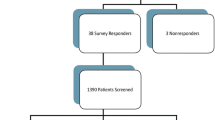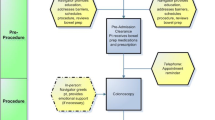Abstract
Background and Aims
Colorectal screening (CRS) rates in minority and uninsured populations have increased through patient navigation (PN) interventions. However, patient knowledge of colonoscopy results and follow-up recommendations has not been described in an African American (AA) population or following PN. Our objectives were to determine patient knowledge of colonoscopy results and follow-up recommendations within an AA patient population and to compare post-colonoscopy knowledge among patients who received either PN or usual care.
Methods
This is a prospective observational study of patients who completed a screening colonoscopy in 2014. A semi-structured telephone survey was completed by 96 participants (69 % AA, 78 % female, and mean age 63 years). The survey assessed patient recall of polyp results and follow-up recommendations. Responses were compared with the medical record.
Results
Of 96 patients surveyed (response rate, 68 %), 83 % accurately reported if polyps were detected and 66 % accurately reported their recommended follow-up. The identification of adenomatous polyps on colonoscopy was a predictor of accurate recall of colonoscopy results and follow-up recommendations. Uninsured patients who completed PN (18 of 96) were more likely to accurately report polyp results (100 vs. 80 %; P = 0.036), but the rates of accurate follow-up recall were not statistically significant (44 vs. 71 %; P = 0.053) when compared to usual care patients.
Conclusions
In an AA population, post-colonoscopy polyp recall rates were similar to those described in white populations. Uninsured patients who completed PN were more likely than insured usual care patients to accurately report the presence of polyps on colonoscopy.

Similar content being viewed by others
Abbreviations
- ADR:
-
adenoma detection rate
- AA:
-
African American
- CRC:
-
colorectal cancer
- CRS:
-
colorectal screening
- CRCSI:
-
colorectal cancer screening initiative
- PN:
-
patient navigation
- PCP:
-
Primary care physician
- UC:
-
University of Chicago
References
Benarroch-Gampel J, Sheffield KM, Lin Y, et al. Colonoscopist and primary care physician supply and disparities in colorectal cancer screening. Health Serv Res. 2012;47(3pt1):1137–57. doi:10.1111/j.1475-6773.2011.01355.x.
Shapiro JA, Seeff LC, Thompson TD, et al. Colorectal cancer test use from the 2005 National Health Interview Survey. Cancer Epidemiol Biomark Prev. 2008;17(7):1623–30.
Wilkins T, Gillies RA, Harbuck S, et al. Racial disparities and barriers to colorectal cancer screening in rural areas. J Am Board Fam Med. 2012;25(3):308–17.
Ayanian JZ. Racial disparities in outcomes of colorectal cancer screening: biology or barriers to optimal care? J Natl Cancer Inst. 2010;102(8):511–3. doi:10.1093/jnci/djq089.
Cooper GS, Koroukian SM. Racial disparities in the use of and indications for colorectal procedures in medicare beneficiaries. Cancer. 2004;100(2):418–24. doi:10.1002/cncr.20014.
Etzioni DA, Ponce NA, Babey SH, et al. A population-based study of colorectal cancer test use. Cancer. 2004;101(11):2523–32. doi:10.1002/cncr.20692.
Nadel MR, Berkowitz Z, Klabunde CN, et al. Fecal occult blood testing beliefs and practices of U.S. primary care physicians: serious deviations from evidence-based recommendations. J Gen Intern Med. 2010;25(8):833–9. doi:10.1007/s11606-010-1328-7.
Esparza A. Patient navigation and the American Cancer Society. Semin Oncol Nursg, Patient Navig Cancer Care. 2013;29(2):91–6. doi:10.1016/j.soncn.2013.02.004.
Chen LA, Santos S, Jandorf L, et al. A program to enhance completion of screening colonoscopy among urban minorities. Clin Gastroenterol Hepatol. 2008;6(4):443–50.
Jandorf L, Gutierrez L, Lopez J, et al. Use of a patient navigator to increase colorectal cancer screening in an urban neighborhood health clinic. J Urban Health. 2014;82(2):216–24. doi:10.1093/jurban/jti046.
Lasser KE, Murillo J, Lisboa S, et al. Colorectal cancer screening among ethnically diverse, low-income patients: a randomized controlled trial. Arch Intern Med. 2011;171(10):906–12. doi:10.1001/archinternmed.2011.201.
Lebwohl B, Neugut AI, Stavsky E, et al. Effect of a patient navigator program on the volume and quality of colonoscopy. J Clin Gastroenterol. 2011;45(5):e47.
Ma GX, Shive S, Tan Y, et al. Community-based colorectal cancer intervention in underserved Korean Americans. Cancer Epidemiol. 2009;33(5):381–6.
Myers RE, Bittner-Fagan H, Daskalakis C, et al. A randomized controlled trial of a tailored navigation and a standard intervention in colorectal cancer screening. Cancer Epidemiol Biomark Prev. 2013;22(1):109–17. doi:10.1158/1055-9965.EPI-12-0701.
Myers RE, Hyslop T, Sifri R, et al. Tailored navigation in colorectal cancer screening. Med Care. 2008;46(9):S123–31.
Nash D, Azeez S, Vlahov D, et al. Evaluation of an intervention to increase screening colonoscopy in an urban public hospital setting. J Urban Health. 2006;83(2):231–43.
Percac-Lima S, Grant RW, Green AR, et al. A culturally tailored navigator program for colorectal cancer screening in a community health center: a randomized, controlled trial. J Gen Intern Med. 2008;24(2):211–7. doi:10.1007/s11606-008-0864-x.
Ritvo PG et al. Personal navigation increases colorectal cancer screening uptake. Cancer Epidemiol Biomark Prev. 2015;24(3):506–11.
Ladabaum U et al. Cost‐effectiveness of patient navigation to increase adherence with screening colonoscopy among minority individuals. Cancer. 2015;121(7):1088–97.
Pelto DJ et al. Predicting colonoscopy completion among African American and Latino/a participants in a patient navigation program. J Racial Ethnic Health Disparities. 2015;2(1):101–11.
Percac‐Lima S et al. The longitudinal impact of patient navigation on equity in colorectal cancer screening in a large primary care network. Cancer. 2014;120(13):2025–31.
Naylor K, Ward J, Polite BN. Interventions to improve care related to colorectal cancer among racial and ethnic minorities: a systematic review. J Gen Intern Med. 2012;27(8):1033–46. doi:10.1007/s11606-012-2044-2.
Baldwin L, Dobie SA, Billingsley K, et al. Explaining black–white differences in receipt of recommended colon cancer treatment. J Natl Cancer Inst. 2005;97(16):1211–20.
Ellison GL, Warren JL, Knopf KB, et al. Racial differences in the receipt of bowel surveillance following potentially curative colorectal cancer surgery. Health Serv Res. 2003;38(6p2):1885–904.
Brueckl WM, Fritsche B, Seifert B, et al. Non-compliance in surveillance for patients with previous resection of large (≥1 cm) colorectal adenomas. World J Gastroenterol. 2006;12(45):7313–8. doi:10.3748/wjg.v12.i45.7313.
Colquhoun P, Chen HC, Kim JI, et al. High compliance rates observed for follow up colonoscopy post polypectomy are achievable outside of clinical trials: efficacy of polypectomy is not reduced by low compliance for follow up. Color Dis. 2004;6(3):158–61. doi:10.1111/j.1463-1318.2004.00585.x.
Kumaravel V, Heald B, Lopez R, et al. Patients do not recall important details about polyps, required for colorectal cancer prevention. Clin Gastroenterol Hepatol. 2013;11(5):543–547.e2. doi:10.1016/j.cgh.2012.12.010.
Budhraja V. Patients don’t know their polyps, but do they know when to repeat colonoscopy? Clin Gastroenterol Hepatol. 2013;11(11):1522. doi:10.1016/j.cgh.2013.06.009.
Nicolaas JS, Jonge V, Cahen DL, et al. Awareness of surveillance recommendations among patients with colorectal adenomas. Clin Gastroenterol Hepatol. 2012;10(4):405–11.
Madlensky L, Daftary D, Burnett T, et al. Accuracy of colorectal polyp self-reports: findings from the colon cancer family registry. Cancer Epidemiol Biomark Prev. 2007;16(9):1898–901. doi:10.1158/1055-9965.EPI-07-0151.
Brock AS, Wallace K, Romagnuolo J, et al. Patients’ short-term knowledge of personal polyp history inadequate despite systematic notification of results after polypectomy. South Med J. 2013;106(4):285–9. doi:10.1097/SMJ.0b013e31828de5f6.
Eisen GM, Baron TH, Dominitz JA, et al. Open access endoscopy. Gastrointest Endosc. 2002;56(6):793–5.
Rex DK, Lieberman D. ACG colorectal cancer prevention action plan: update on CT-Colonography. Am J Gastroenterol. 2006;101(7):1410–3. doi:10.1111/j.1572-0241.2006.00585.x.
Shokar NK, Vernon SW, Weller SC. Cancer and colorectal cancer: knowledge, beliefs, and screening preferences of a diverse patient population. Fam Med. 2005;37(5):341–7.
Mehta CR, Patel NR. Exact logistic regression: theory and examples. Stat Med. 1995;14(19):2143–60.
Heinze G, Schemper M. A solution to the problem of separation in logistic regression. Stat Med. 2002;21(16):2409–19.
Klabunde CN, Schenck AP, Davis WW. Barriers to colorectal cancer screening among Medicare consumers. Am J Prev Med. 2006;30(4):313–9. doi:10.1016/j.amepre.2005.11.006.
Braschi C, Pelto DJ, Hennelly MO, et al. Patient-, provider-, and system-level factors in low adherence to surveillance colonoscopy guidelines: implications for future interventions. J Gastrointest Cancer. 2014;45(4):500–3. doi:10.1007/s12029-014-9653-4.
Compliance with Ethical Standards
ᅟ
Conflicts of interest
Cassandra Fritz, Keith Naylor, and Karen Kim declare that they have no conflicts of interest.
Ethical Approval
All procedures performed in studies involving human participants were in accordance with the ethical standards of the institutional and/or national research committee and with the 1964 Helsinki declaration and its later amendments or comparable ethical standards.
Informed Consent
Informed consent was obtained from all individual participants included in the study.
Author information
Authors and Affiliations
Corresponding author
Additional information
Cassandra Fritz and Keith Naylor contributed equally to this work.
Rights and permissions
About this article
Cite this article
Fritz, C., Naylor, K. & Kim, K. Knowledge of Polyp History and Recommended Follow-Up Among a Predominately African American Patient Population and the Impact of Patient Navigation. J. Racial and Ethnic Health Disparities 3, 403–412 (2016). https://doi.org/10.1007/s40615-015-0152-5
Received:
Revised:
Accepted:
Published:
Issue Date:
DOI: https://doi.org/10.1007/s40615-015-0152-5




